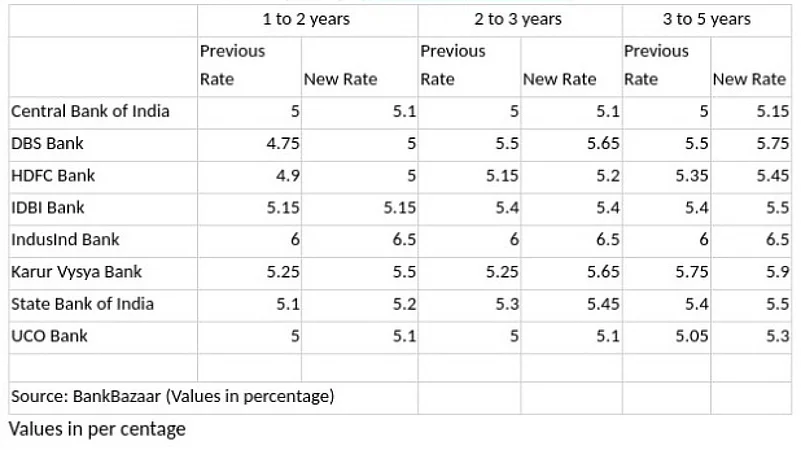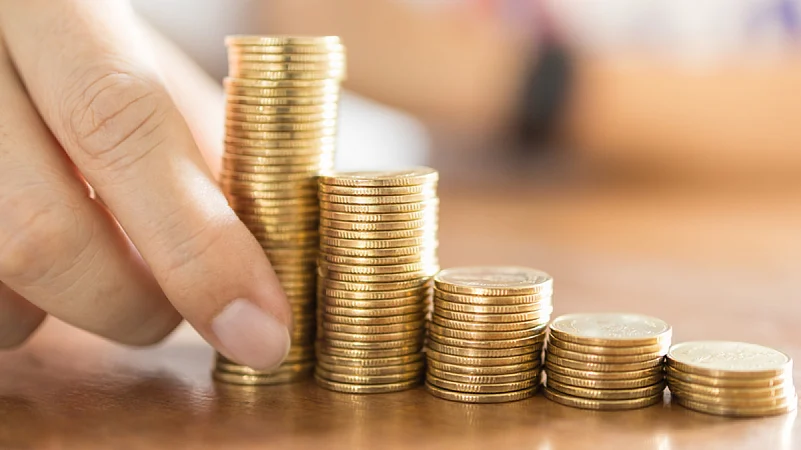Within a few days of State Bank of India and HDFC Bank increasing interest rates on fixed deposits (FDs), several other banks, including IDBI Bank and IndusInd Bank, followed suit. Earlier, Central Bank and UCO Bank also increased FD rates (see table).
The rate hikes have rolled in despite the Reserve Bank of India (RBI) keeping the repo and reverse repo rates unchanged in the last monetary policy announcement on February 10. The repo and reverse repo rates currently stand at 4 per cent and 3.35 per cent, respectively.
Mostly senior citizens invest in FDs as the returns are guaranteed and not affected by market volatility. Moreover, a lot of them are not in the highest income tax slabs. FDs are taxed at slab rates and returns from them may not be efficient considering that tax and inflation bites off a substantial portion from them. However, with banks increasing the FD interest rates, many young investors may also tend to invest in them for their debt allocation.
Should You Invest Now?
While interest rates on FDs are going up, is it the right time to lock your money in these instruments? Here are a few things that investors should keep in mind before investing in FDs.

Wait For A Few More Months: Experts suggest that it makes sense to wait for a few more months as the rates are likely to go up further in near future. “As government securities (G-Secs) rate usually serves as a benchmark for interest rates on FDs, the increase in G-Sec (10-year bond yield) from 6.4 per cent on January 3, 2022 to 6.68 per cent on January 27, 2022 to 6.69 per cent on February 21, 2022 may be causing the increase in interest rate on FDs in the coming times,” says Pradeep Multani, president, PHD Chamber of Commerce and Industry, an industry body. Values in per centage
Go For Short-Term Investment: Since there is a high chance that the rates are likely to go up in the near future, you could invest for the short term, considering that the interest rates will rise in future. “The interest rate on short term deposits may go up in the short term amid the inflation being on the higher side due to rising oil prices at global level and escalation in geo-political tensions. The effect on long-term deposit rates will only be if inflation sustains in higher trajectory,” says Multani.
Use To Create Emergency Corpus: Short-term FDs can also come in handy to park your emergency corpus, irrespective of the prevailing interest rates. “Investors can consider parking money they need in the near-term or the emergency fund they have built for themselves in fixed deposits,” Harshad Chetanwala, a certified financial planner and co-founder My Wealth Growth, a financial planning firm. Keeping your emergency corpus in the savings account is not advisable as you may end up using the money for other purposes if you are not disciplined enough.
Good Choice For Novice Investors: New investors may have money to invest but it may take some time for them to understand the market complexity. For them, FD may be a good option to understand how investments work. “The interest rates offered on FDs are higher than those for savings accounts, providing the better returns. Since there is no market involvement in FDs, the risk factor is extremely low,” adds Multani.
Consider The Consequence: While having good returns on FD brings relief to investors, one needs to be prepared for the consequence it may have on other sectors. “If interest rate is continuously going up, they will have some impact on real estate sector as banks also start increasing the interest on home loans,” adds Multani.













